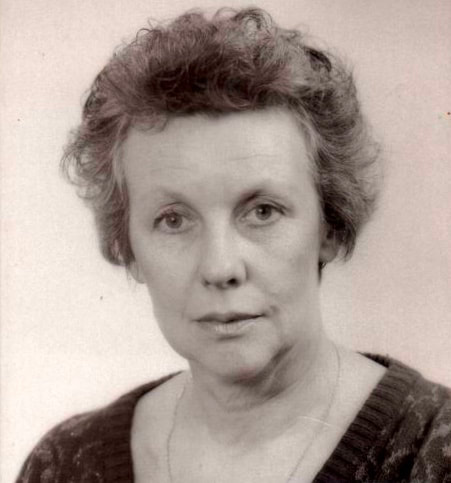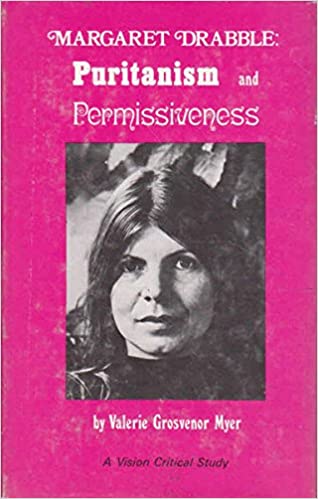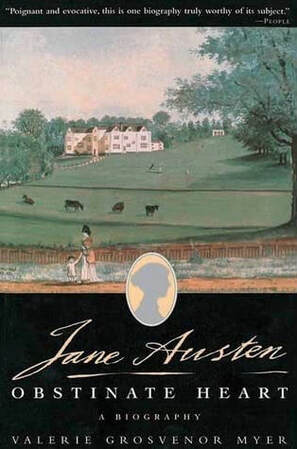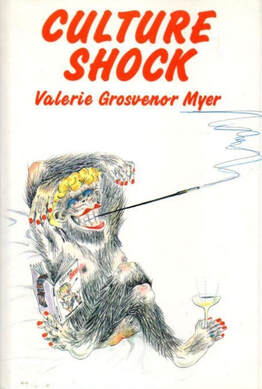Valerie grosvenor-myer
|
1935 - 2007
Growing up in the village of Soudley in the Forest of Dean, as a child her home was without electricity or indoor sanitation. Trained as a librarian she began writing pieces for the local paper. After a degree at Cambridge as a mature student she went on to success as an academic, international journalist, critic, editor, novelist and poet. |
EARLY LIFE & EDUCATION
Valerie Winifred Godwin was born in Soudley in the Forest of Dean on 13 April 1935. The maiden name of both her grandmothers was Grosvenor, her parents were second cousins, (and believed to be descended from an illegitimate branch of the Westminster family). Her father Donald Godwin, born in Somerset, was a coal miner, who had looked after pit ponies as a boy. He became an insurance clerk and during the Second World War worked for the Forestry Commission. (Donald died when Valerie was 21). Her mother, Margaret Blanche Jones was born in Leytonstone, the daughter of a policeman, and attended a private school in London. In 1939 the family were living at Old Post Office, Lower Soudley along with Donald’s mother Margaret Martha Godwin nee Grosvenor, who was born in Soudley. At that time, like much of the village, her home had no electricity or indoor sanitation until she was in her late teens. She had one sister, Wendy born in 1939. Valerie attended East Dean Grammar School, in Cinderford, but family circumstances meant she left in 1951 aged 16. On leaving school she trained as a librarian in Gloucester and began freelance writing for the Dean Forest Mercury newspaper based in Cinderford. While on holiday in Brittany in 1956 she met Michael Myer from Hampstead, London. They married in 1959 and settled in Hampstead. The couple integrated the maiden name shared by Valerie’s grandmothers into their marital name. Michael, a Cambridge graduate, worked variously as a teacher, folk singer and theatre critic.
becoming a writer
|
After moving to London Valerie worked as a reporter to the Dartford Chronical, in Kent as Chief Court Reporter in 1958. She then moved from local papers to Fleet Street women’s magazines, first Housewife, (subeditor) and then Flair (Chief sub-editor). Michael encouraged her to continue studying and she enrolled on an English course at the City Literary Institute where her teacher suggested she go to university. In 1963, aged 28, she was accepted into Newham College, Cambridge, to read English. During her time at Cambridge she continued with her journalism writing theatre criticism for The Guardian. She was taught in her third year by the distinguished Q. D. Leavis, who was known to hold forth on the virtues of the ‘organic community’ during the course of a discussion of Thomas Hardy’s Jude the Obscure. Valerie mentioned that she knew from her own rural upbringing with no electricity or modern sanitation that such a life could have its disadvantages and was ‘not all it was cracked up to be’. Valerie graduated in 1966 with first class honours in English having developed an enduring interest in the novel.
|
She studied for a Postgraduate Certificate in Education at Hughes Hall, Cambridge and taught briefly at secondary level before joining the Times Educational Supplement, as deputy features editor, and The Teacher, (weekly newspaper of the National Union of Teachers) as features and literary editor. It was during this period that she wrote her first book Margaret Drabble: Puritanism and Permissiveness (1974), an exploration of moral issues in Margaret Drabbles novels.
BIOGRAPHER
|
Valerie published a number of books, including two books on Jane Austen: a critical study (1980), and later a biography, Obstinate Heart (1997). Other books on the novel were Truculent Spirit (1987) a history of critical writings about Charlotte Bronte, and Ten Great English Novelists (1990). There were two further biographies. A Victorian Lady in Africa: The Story of Mary Kingsley (1989) tells the story of Mary Henrietta Kingsley an English writer and explorer whose travels throughout West Africa and resulting work helped shape European perceptions of African cultures and British imperialism. Later came Harriette Wilson, Lady of Pleasure (1999), described as a romping, bawdy biography of the 19th century Mayfair Courtesan, whose lovers included the Duke of Wellington and the brother of the then prime minister Viscount Melbourne. As Sue Limb observed in her introduction, Grosvenor Myer’s account of the lady and her pleasures was “triumphantly unzipped” and “shamelessly and enjoyably displayed”.
|
EDITOR, CRITIC & AcademicAs editor she compiled works on the eighteenth century writers: Laurence Sterne: Riddles and Mysteries (1984) and Samuel Richardson: Passion and Prudence (1987). Her standing as a critic resulted in her being invited to contribute to both Margaret Drabble’s The Oxford Companion to English Literature (1985) and The Cambridge Guide to Literature in English (ed Ian Ousby, 1988). Her final academic work was to co-edit with Steven R. Serafin the Continuum Encyclopaedia of British Literature (2003), an ambitious work published in New York aimed at American students, with two further editions published in 2006 and 2012. In addition to her writing Valerie undertook Cambridge University supervisions, lectured at various times in the USA (School of the Art Institute of Chicago), Canada (University of New Brunswick at St John), France (University of Bourges), and Sweden (Lund University) and for the Cambridge Folklore Group, the Cambridge Jane Austen Society, the University of the Third Age, and several Cambridge-based international Summer Schools. She chaired the Sterne sessions of the Canadian Association for Eighteenth Century Studies at the University of St John, New Brunswick. She adjudicated poetry competitions and taught creative writing.
Valerie also contributed short stories to Arts Council UK anthologies edited by Margaret Drabble and Angus Wilson, such as The Student, published in 1978 and reviewed in The Times [1] along with poems, essays and reviews to over fifty journals. She reviewed books for the academic journal Notes and Queries such as Jane Austen and the soul of a prostitute (The Times, 22nd June 1978). She was for many years Cambridge theatre critic for The Stage. |
CHINAIn 1988 – 89 Valerie taught for a year at Beijing Language University. Her posting was cut short by the Tiananmen Square massacre on June 4 1989. She had visited the square on the day before to witness the turmoil of the student protests and the night after it sheltered a group of them in her apartment. Advised to leave the country by any means possible, she spent a night in the Beijing Toronto hotel – where the next morning bullet holes were found in the building walls –and managed to hitch a lift to the airport in the US embassy bus. In 1991–2 she spent a year teaching at the University of Sierra Leone in Freetown. Then having been begged to return to Beijing, in 1992-93 she compiled and edited a standard English comprehension textbook for the students of English at Chinese universities with Professor Li Yanshu (Advanced College Reading). |
NOVELIST
|
Her first novel, Culture Shock (1988), was chosen as one of The Observer’s books of the year. It was reviewed by Isabel Quigley in the Financial Times as ‘a first novel and a talented one … full of “glitzy stylistic promise”. It is the story of a Japanese scholar who goes to a fictional college “somewhere between Oxford and Cambridge”, and despite being an advanced student of English literature, innocently misinterprets the social situations in which she finds herself. “The point of the story” wrote the author, “is that wherever our bodies may happen to be, we carry within our own heads our native languages, our own assumption as to what is normal, right and proper….And we judge other culture, however hard we try to be cosmopolitan, broadminded, tolerant, inevitably by the limited and provincial standards of our home country". Her second novel, The Butterfly House (1998), was based on her Tiananmen Square experiences. In it the euphoric rise of the democracy movement and its catastrophic outcome are seen through the eyes of a British widow teaching English in China.
|
POET
She wrote poetry which appeared in Peepshow (1975), a small booklet of 24 poems (most of which had been published elsewhere) and dedicated to her mother, lovers and friends. Her work was included in New Poetry (ed Norman Hidden), The Interpreter's House (ed Merryn Williams), and Chelmer Festival Anthology. Two of her later poems, 'Nocturne’ and ‘Sing a Song at Sixty’ were posted by her husband Michael on a poetry website after her death.
FINAL YEARS
In the last decade of her life she suffered from Parkinson’s Disease. She died on 9 August 2007, aged 72, at her home in Haddenham, Cambridgeshire, having taken an overdose. At the inquest following her death, her husband described her and their life together and how with the progression of her Parkinson’s disease she had found life increasingly frustrating and difficult which led to her decision to end her own life. She was cremated and her husband scattered her ashes in their garden.
Those who knew her describe her as "possessing a restlessly inquiring curiosity and a discerning intellect; ambitious but without vanity or snobbery. Throughout her life she is said to have remained scathingly critical of the increasing influence of “celebrity” culture on literature standards," whilst others said of her that
"she was always courteous and kind, she had an effervescent and generous personality and an alert scene of humour. An elegant figure with a room – illuminating smile, she was a great talker and giggler with a pithy sense of humour and an epigrammatic wit, self –depreciating about her own not inconsiderable achievements she was always gracious and generous in her praise ad support of others" (Brian Sibley inThe Independent, 13th August 2007)
Those who knew her describe her as "possessing a restlessly inquiring curiosity and a discerning intellect; ambitious but without vanity or snobbery. Throughout her life she is said to have remained scathingly critical of the increasing influence of “celebrity” culture on literature standards," whilst others said of her that
"she was always courteous and kind, she had an effervescent and generous personality and an alert scene of humour. An elegant figure with a room – illuminating smile, she was a great talker and giggler with a pithy sense of humour and an epigrammatic wit, self –depreciating about her own not inconsiderable achievements she was always gracious and generous in her praise ad support of others" (Brian Sibley inThe Independent, 13th August 2007)
Her work & the forest of dean
While none of her books make direct reference to the Forest of Dean, interestingly her main character in her novel The Butterfly House is named Jilly Drybrook. Drybrook is a small village a few miles from where Valerie she grew up. Like Valerie, Jilly grew up in rural Gloucestershire in the 1940’s and carried candles to bed as there was no electricity. Her daughter in the book accuses her to having read too much Thomas Hardy, a reference back to the comments made to Valerie by her tutor at Cambridge. Jilly also comments that there is a big difference between a London comprehensive school of 1,200 to a quiet country grammar school. In addition, her poetry book, Peepshow, published when Valerie was 40, was perhaps influenced by her early life with references to my father, mother, old pig cots and butchering meat. It may be speculated also the theme in her novel Culture Shock may have been influenced by her own experience of coming from a quite village in the Forest of Dean and having left school at 16 to the setting of the elite Cambridge University.
Valerie’s full and varied life and numerous achievements are especially remarkable for someone with a humble start in life who left school at 16. In her books she leaves behind a longstanding legacy to the world of literature. Her works have been translated into several languages including Polish, Swedish, Chinese, German and Dutch. She is certainly a role model for anyone considering taking a university degree as a mature student. A daughter for the Forest to be proud of.
Valerie’s full and varied life and numerous achievements are especially remarkable for someone with a humble start in life who left school at 16. In her books she leaves behind a longstanding legacy to the world of literature. Her works have been translated into several languages including Polish, Swedish, Chinese, German and Dutch. She is certainly a role model for anyone considering taking a university degree as a mature student. A daughter for the Forest to be proud of.
Researched and compiled by Teresa Davies.
Sources
The Independent, 13th August 2007 (Brian Sibley)
The Guardian, 15th August 2007 (Sue Limb)
The Times, 16th August 2007
The Stage, 7th September 2007
'Why Michael Grosvenor Myer left his wife to die alone' in The Telegraph, 29th November 2008
'Why I helped my Parkinson’s disease suffering wife plan her own suicide….. then left her to die' in The Mail [on line] 5th December 2008
'Author Myer overdosed on paracetamol after battling Parkinson’s for 10 years' in The Daily Mail, 13th November 2007
'Valerie Grosevnor-Myer' Wikipedia.
The Independent, 13th August 2007 (Brian Sibley)
The Guardian, 15th August 2007 (Sue Limb)
The Times, 16th August 2007
The Stage, 7th September 2007
'Why Michael Grosvenor Myer left his wife to die alone' in The Telegraph, 29th November 2008
'Why I helped my Parkinson’s disease suffering wife plan her own suicide….. then left her to die' in The Mail [on line] 5th December 2008
'Author Myer overdosed on paracetamol after battling Parkinson’s for 10 years' in The Daily Mail, 13th November 2007
'Valerie Grosevnor-Myer' Wikipedia.






